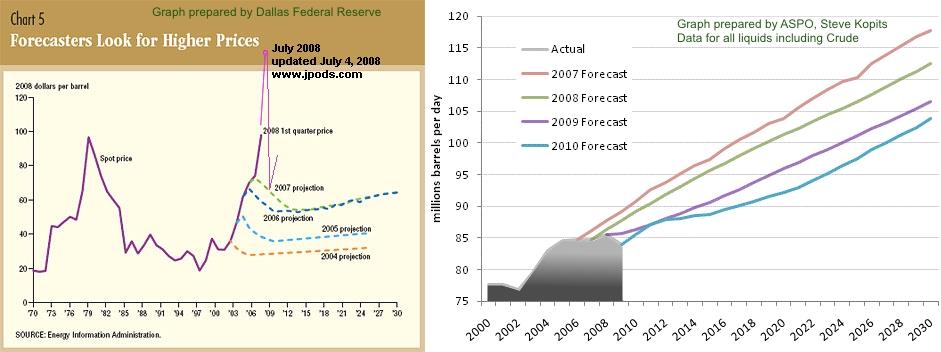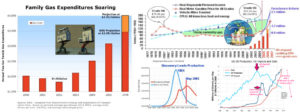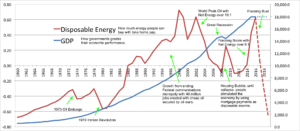The Metric of Disposable Energy, how much energy people can buy with their take-home pay, provided a tool that warned of and might have mitigated the Great Recession.The crisis of 2008 is likely to replay by 2023.In May 2008, the Dallas Federal Reserve published a report on how DOE and its EIA failed to warn policymakers of the risks of rising gasoline prices. In July 2008, I used the following graphs to brief Senate and campaign staffs for Senators Obama and McCain.
In July 2008, I used the following graphs to brief Senate and campaign staffs for Senators Obama and McCain.
- The left graph shows how rising gasoline prices consumed family disposable income.
- The top right graph was published by US DOT in 2004 on the spread between rising incomes and stable gasoline prices.
- I added the frog in a pot of cool water on a fire, the bar graph of gasoline decreasing disposable income, and the graph of foreclosures.
- The bottom center graph shows Peak Oil discovery in 1964.
- Botton right graph shows US Peak Oil in 1970, with national debt increasing in tandem with oil imports after 1970.
Only Bud McFarlane recognized the risks. Both Senate staffs stated Federal regulations could manage the foreclosure issue. Two months later, foreclosures collapsed the banking system and nearly the entire economy. This set of graphs:
This set of graphs:
- Top Left: Loss of disposable income from rising gasoline prices.
- Top Right: GDP (blue line) gave no warning of the foreclosure crisis, Disposable Energy (red line, how much energy people can buy with their take-home pay) started warning of the 2008 crisis in 1998.
- Bottom Left: Correlation between rising gasoline prices and unemployment 2 years later.
- Bottom Right: Illustration of Economic Momentum as a function of labor applying energy.
- The more affordable energy is, the more labor is needed to employ it. GDP failed to warn the crisis of 2008 because it is a measure of economic momentum not of the inputs to economic momentum.
 Below is a long-term graph of the difference between GDP and Economic Momentum. Note that GDP did not register the crisis of the 1973 Oil Embargo nor the 1979 Iran Revolution and barely registered The Great Recession in 2008.
Below is a long-term graph of the difference between GDP and Economic Momentum. Note that GDP did not register the crisis of the 1973 Oil Embargo nor the 1979 Iran Revolution and barely registered The Great Recession in 2008.